Introduction
The fascinating world of culinary mushrooms offers a diverse array of flavors, textures, and nutritional benefits that can enhance both your meals and your health. Among the most intriguing varieties are maitake and oyster mushrooms, two distinct fungi that have gained popularity among chefs, home cooks, and health enthusiasts alike.
While both mushrooms offer impressive nutritional profiles and unique culinary applications, they differ significantly in appearance, taste, growing conditions, and potential health benefits. Whether you're a mushroom forager, a home cultivator, or simply a food lover looking to expand your culinary horizons, understanding these differences can help you make informed choices about which mushroom best suits your needs.
In this comprehensive guide, we'll explore the many facets of maitake and oyster mushrooms, from their distinctive characteristics and nutritional content to their culinary applications and cultivation requirements. By the end, you'll have a thorough understanding of what sets these two remarkable fungi apart and how to make the most of their unique qualities.
Physical Characteristics and Identification
Maitake Mushrooms: The Dancing Mushroom
Maitake mushrooms (Grifola frondosa) are commonly known as "hen of the woods," "sheep's head," or "ram's head" mushrooms. In Japanese, "maitake" means "dancing mushroom," a name that allegedly originated from people dancing with joy upon finding these valuable fungi in the wild.
These mushrooms grow in large, feathery clusters that can weigh anywhere from a few pounds to over 50 pounds (23 kilograms) in exceptional cases. Their appearance is distinctive, with multiple grayish-brown caps that overlap in a manner reminiscent of a hen's feathers or a sheep's fleece, hence their common names.
Maitake mushrooms typically grow at the base of oak trees, though they can occasionally be found near maple, elm, and other hardwood trees. Their growth pattern is characterized by a large, interconnected base that branches out into numerous smaller, fan-shaped caps with wavy edges.
Oyster Mushrooms: The Shell-Shaped Fungi
Oyster mushrooms (Pleurotus ostreatus) are named for their oyster-shaped caps that resemble the shells of their namesake. These mushrooms grow in clusters but have a different appearance from maitake mushrooms.
Oyster mushrooms have broad, fan-shaped caps that range in color from white to gray, pale yellow, or even pinkish, depending on the variety. Their stems are short and often positioned off-center or to the side of the cap. The gills run down the stem, a characteristic known as "decurrent gills."
Unlike maitake mushrooms, which primarily grow at the base of trees, oyster mushrooms typically grow on the sides of trees, fallen logs, or stumps. They can be found on a variety of both hardwood and softwood trees, making them more widely distributed in nature.
Nutritional Comparison
Both maitake and oyster mushrooms are nutritional powerhouses, offering impressive health benefits with minimal calories. However, there are some notable differences in their nutritional profiles that might make one more suitable than the other depending on your dietary needs.
Macronutrients
Both mushrooms are low in calories, with oyster mushrooms containing approximately 33 calories per 100 grams and maitake mushrooms slightly fewer at about 31 calories per 100 grams.
When it comes to protein content, oyster mushrooms have the edge with approximately 3.3 grams per 100 grams compared to maitake's 1.9 grams. This makes oyster mushrooms a better choice for those looking to increase their protein intake, especially those following plant-based diets.
Maitake mushrooms, however, contain more dietary fiber at 2.7 grams per 100 grams versus oyster mushrooms' 2.3 grams. This higher fiber content makes maitake mushrooms particularly beneficial for digestive health and feeling fuller longer.
Both mushrooms are low in fat, with maitake containing slightly less fat (0.2 grams per 100 grams) compared to oyster mushrooms (0.4 grams per 100 grams).

Vitamins and Minerals
One of the most significant nutritional differences between these mushrooms is their vitamin D content. Maitake mushrooms are an excellent source of vitamin D, containing about 1,123 IU per 100 grams, which is approximately 37 times more than what's found in oyster mushrooms (29 IU per 100 grams).
Oyster mushrooms, on the other hand, contain more iron (1.3 mg per 100 grams) compared to maitake mushrooms (0.3 mg per 100 grams), making them more beneficial for those concerned about iron intake.
Both mushrooms are good sources of B vitamins, though oyster mushrooms contain higher amounts of niacin and pantothenic acid, while maitake mushrooms have slightly more riboflavin.
In terms of potassium, oyster mushrooms lead with approximately 420 mg per 100 grams, compared to maitake's 204 mg per 100 grams.
Flavor Profile and Culinary Uses
The flavor differences between maitake and oyster mushrooms are quite distinct, which affects how they're used in various cuisines and dishes.
Maitake Mushroom Flavor
Maitake mushrooms have a rich, earthy, and somewhat woodsy flavor profile that many describe as robust and complex. There's often a slight peppery or spicy note to them, along with a distinct umami quality that deepens the flavor of dishes they're added to.
The texture of maitake is firm and somewhat chewy, with a pleasant bite that holds up well during cooking. This makes them excellent for methods that require longer cooking times, such as braising, roasting, or slow simmering.
Oyster Mushroom Flavor
Oyster mushrooms offer a more delicate, mild, and subtly sweet flavor profile compared to the bold taste of maitake. Some varieties have a slight anise or licorice-like note, while others are described as having a seafood-like quality (hence the name "oyster" mushroom).
The texture of oyster mushrooms is velvety and tender, though they still maintain a pleasant firmness when cooked properly. They're more delicate than maitake, which influences how they're best prepared.

Culinary Applications
Maitake Mushrooms in the Kitchen
Due to their robust flavor and firm texture, maitake mushrooms excel in:
- Stir-fries: Their ability to hold up to high heat and absorb flavors makes them perfect for quick, hot cooking methods.
- Soups and stews: Maitake can simmer for extended periods while maintaining their texture and infusing the broth with their rich flavor.
- Roasting and grilling: Their meaty texture makes them ideal for these methods, which enhance their natural earthiness.
- As a meat substitute: The substantial texture and umami flavor of maitake make them an excellent plant-based alternative in dishes traditionally made with meat.
Oyster Mushrooms in the Kitchen
With their delicate flavor and tender texture, oyster mushrooms are best suited for:
- Quick sautés: Their mild flavor is enhanced by simple cooking methods that don't overwhelm them.
- Pasta dishes: They add a gentle mushroom flavor without dominating other ingredients.
- Risottos: Their subtle sweetness complements the creamy nature of risotto.
- Soups: Though they should be added toward the end of cooking to prevent them from becoming too soft.
- Tempura and frying: Their delicate texture works well with light batters and quick frying techniques.
Health Benefits
Both mushrooms offer impressive health benefits, though there are some differences in their potential therapeutic effects.
Maitake Mushroom Health Benefits
Maitake mushrooms have been studied extensively for their potential medicinal properties:
- Immune system support: The beta-glucans in maitake, particularly D-fraction, have been shown to stimulate immune activity.
- Blood sugar regulation: Some research suggests that maitake extracts may help reduce blood sugar levels and improve insulin sensitivity.
- Potential cancer-fighting properties: Studies have investigated maitake's ability to enhance the effects of chemotherapy and potentially inhibit tumor growth.
- Cholesterol management: Animal studies have indicated that maitake may help lower triglyceride and cholesterol levels.
- Vitamin D boost: As mentioned earlier, maitake mushrooms are exceptionally high in vitamin D, which is crucial for bone health, immune function, and mood regulation.
Oyster Mushroom Health Benefits
Oyster mushrooms offer their own impressive array of potential health benefits:
- Cholesterol reduction: These mushrooms contain compounds that may help lower cholesterol levels.
- Antioxidant properties: Oyster mushrooms contain several antioxidants that help combat oxidative stress in the body.
- Anti-inflammatory effects: Some studies suggest that oyster mushrooms may help reduce inflammation.
- Heart health: Their combination of nutrients and bioactive compounds may support cardiovascular health.
- Protein source: Their higher protein content makes them valuable for those seeking plant-based protein options.
Cultivation Comparison
The cultivation requirements for maitake and oyster mushrooms differ significantly, which affects their availability and price in markets.
Maitake Mushroom Cultivation
Maitake mushrooms are generally considered more challenging to cultivate than oyster mushrooms. Here's why:
- Substrate specificity: Maitake strongly prefers hardwood substrates, particularly oak, which limits growing options.
- Longer incubation period: Maitake mushrooms require a longer period for mycelium to colonize the substrate fully before fruiting, sometimes taking months or even years when grown on logs.
- Environmental sensitivity: They need specific temperature, humidity, and air exchange conditions to fruit properly.
- Less predictable yields: Even under ideal conditions, maitake can be less consistent in its fruiting patterns.
These factors contribute to maitake mushrooms often being more expensive and less widely available than oyster mushrooms.
Oyster Mushroom Cultivation
Oyster mushrooms are known as one of the easiest mushrooms to cultivate, which has contributed to their popularity:
- Substrate versatility: Oyster mushrooms can grow on a wide range of materials, including straw, coffee grounds, paper products, and various types of wood, making them highly adaptable.
- Rapid colonization: They colonize substrates quickly, often ready to fruit within weeks rather than months.
- Forgiving nature: Oyster mushrooms are more tolerant of variations in growing conditions, making them suitable for beginners.
- Productive yields: They typically produce multiple flushes (harvests) from the same substrate with relatively high biological efficiency.
Due to these factors, oyster mushrooms are generally less expensive and more widely available in markets compared to maitake.
Home Cultivation Tips
If you're interested in growing these mushrooms at home, here are some specific tips for each variety:
Growing Maitake Mushrooms at Home
- Start with a kit: For beginners, a ready-to-fruit maitake grow kit is the easiest option.
- Log cultivation: If attempting log cultivation, use freshly cut oak logs at least 6 inches in diameter.
- Patience is key: Be prepared to wait several months to a year or more before seeing your first harvest.
- Consistent conditions: Maintain temperature around 60-70°F (15-21°C) and high humidity (85-95%) during fruiting.
- Mimic nature: For outdoor cultivation, place logs in shady, moist areas that mimic the natural growing conditions of maitake.
Growing Oyster Mushrooms at Home
- Choose your method: Options include straw bags, buckets, logs, or commercial grow kits.
- Substrate options: Experiment with straw, coffee grounds, cardboard, or hardwood sawdust.
- Temperature flexibility: Different oyster varieties thrive at different temperatures, so select the appropriate strain for your environment.
- Quick results: Expect to see pins (baby mushrooms) forming within 2-3 weeks after the substrate is fully colonized.
- Multiple harvests: With proper care, oyster mushroom substrates can produce 2-3 flushes before being exhausted.
Market Availability and Cost Comparison
The differences in cultivation difficulty, growth rate, and yield directly affect the market availability and cost of these two mushroom varieties.
Maitake Market Factors
- Higher price point: Due to their cultivation challenges and slower growth, maitake mushrooms typically command a premium price, often $20-30 per pound for fresh specimens.
- Seasonal availability: Wild maitake has strong seasonality, typically available in late summer through fall.
- Limited cultivation: Fewer commercial growers produce maitake compared to oyster mushrooms.
- Value-added products: Maitake is commonly found in supplement form (capsules, powders, extracts) due to its medicinal reputation.
Oyster Market Factors
- Greater affordability: Thanks to easier cultivation, oyster mushrooms are typically priced lower, often ranging from $8-15 per pound.
- Year-round availability: Commercial cultivation ensures oyster mushrooms are available throughout the year.
- Variety options: Markets may carry several varieties of oyster mushrooms, including pearl, blue, pink, and king oysters.
- Fresh dominance: While available dried, oyster mushrooms are most commonly sold fresh due to their widespread cultivation.
Foraging Considerations
For those interested in wild mushroom foraging, both maitake and oyster mushrooms are popular targets, but with important differences.
Foraging for Maitake
- Habitat: Primarily found at the base of oak trees, though occasionally near other hardwoods.
- Season: Typically fruiting in late summer through fall (August-November).
- Perennial growth: Maitake often return to the same location year after year, making known spots valuable.
- Look-alikes: Has some similar-looking species, though most are not dangerous; proper identification is still crucial.
- Size: Can be quite large (up to 50 pounds), making a single find potentially very rewarding.
Foraging for Oyster Mushrooms
- Habitat: Found on dying or dead trees, fallen logs, and stumps of various hardwood and sometimes softwood species.
- Season: Can be found year-round depending on climate, with different species having different peak seasons.
- Widespread distribution: More commonly found due to their less specific growing requirements.
- Few dangerous look-alikes: Generally considered one of the safer mushrooms to forage for beginners.
- Multiple growth flushes: May appear multiple times throughout the year in the same location.
Storage and Preservation
Both mushrooms can be preserved in various ways, though their different textures and moisture contents affect optimal storage methods.
Storing Maitake Mushrooms
- Fresh storage: Keep unwashed in a paper bag in the refrigerator for up to a week.
- Drying: Maitake dries well, concentrating its flavor and extending shelf life to months. Rehydrate before use.
- Freezing: Can be frozen raw or after sautéing. Pre-cooked freezing often yields better texture.
- Powdering: Dried maitake can be ground into powder for use in supplements or as a flavor enhancer.

Storing Oyster Mushrooms
- Fresh storage: Store in a paper bag in the refrigerator; best used within 3-5 days as they tend to deteriorate more quickly than maitake.
- Freezing: Best frozen after brief sautéing to preserve texture.
- Drying: While possible, dried oyster mushrooms tend to have less flavor intensity than other dried varieties.
- Pickling: Their delicate texture works well for pickling, which can preserve them for months.
Conclusion: Choosing Between Maitake and Oyster Mushrooms
Both maitake and oyster mushrooms offer unique culinary experiences and health benefits, making them valuable additions to your diet. Your choice between them might depend on several factors:
Choose maitake mushrooms if you:
- Prefer a stronger, more complex flavor profile
- Are looking for the highest vitamin D content
- Need mushrooms that hold up well to longer cooking methods
- Want higher fiber content
- Are interested in their specific medicinal properties
- Don't mind paying a premium price for their unique qualities
Choose oyster mushrooms if you:
- Prefer a milder, more delicate mushroom flavor
- Want a higher protein content
- Need mushrooms that cook quickly
- Are looking for a more affordable option
- Are new to mushroom cultivation and want an easier growing experience
- Value year-round availability
Of course, there's no reason not to enjoy both varieties, using each one when its particular characteristics would best complement your dishes. The versatility of these fungi means they can each find a place in a diverse, nutritious diet.
Whether you're sautéing oyster mushrooms for a light pasta dish or roasting maitake for a hearty side, you're tapping into centuries of culinary tradition and modern nutritional wisdom that recognizes the value of these remarkable organisms.
Both maitake and oyster mushrooms represent the fascinating intersection of gastronomy, nutrition, and traditional wisdom that makes the world of fungi so captivating to explore.

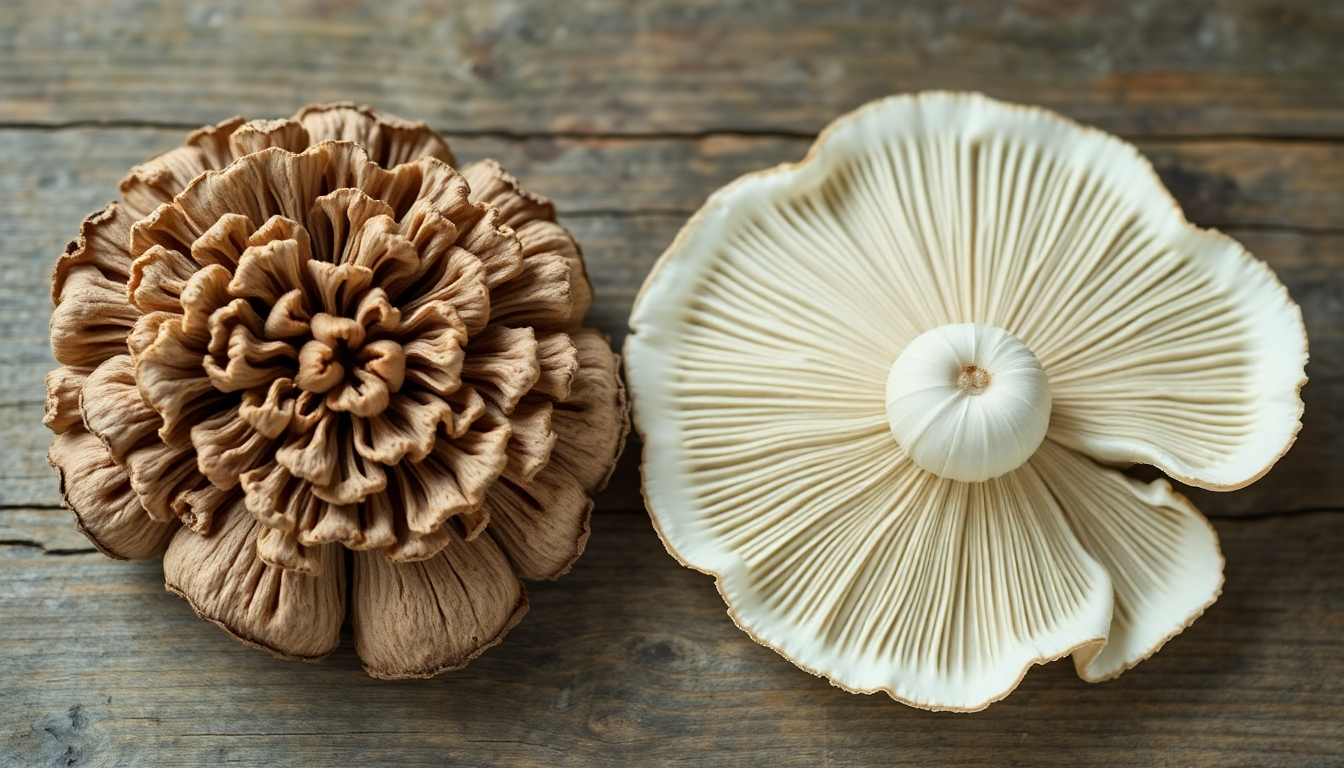
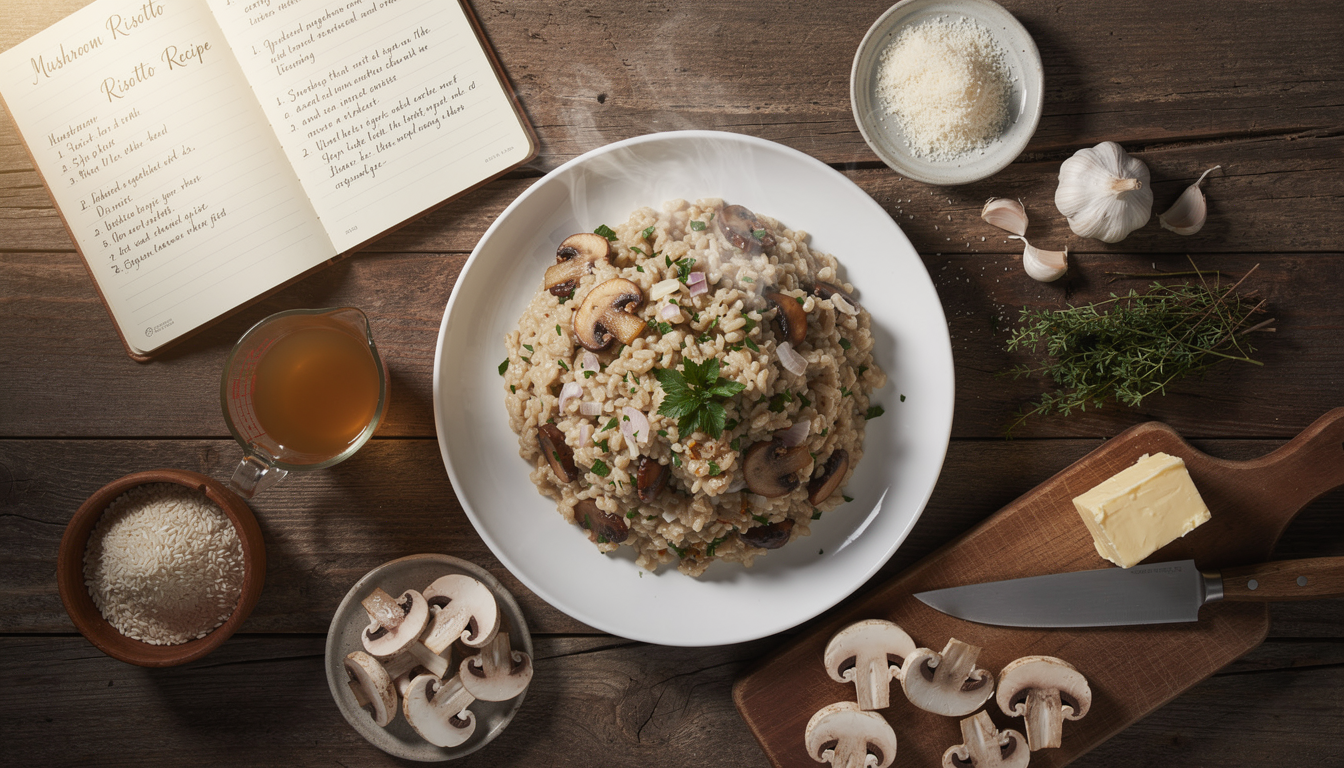
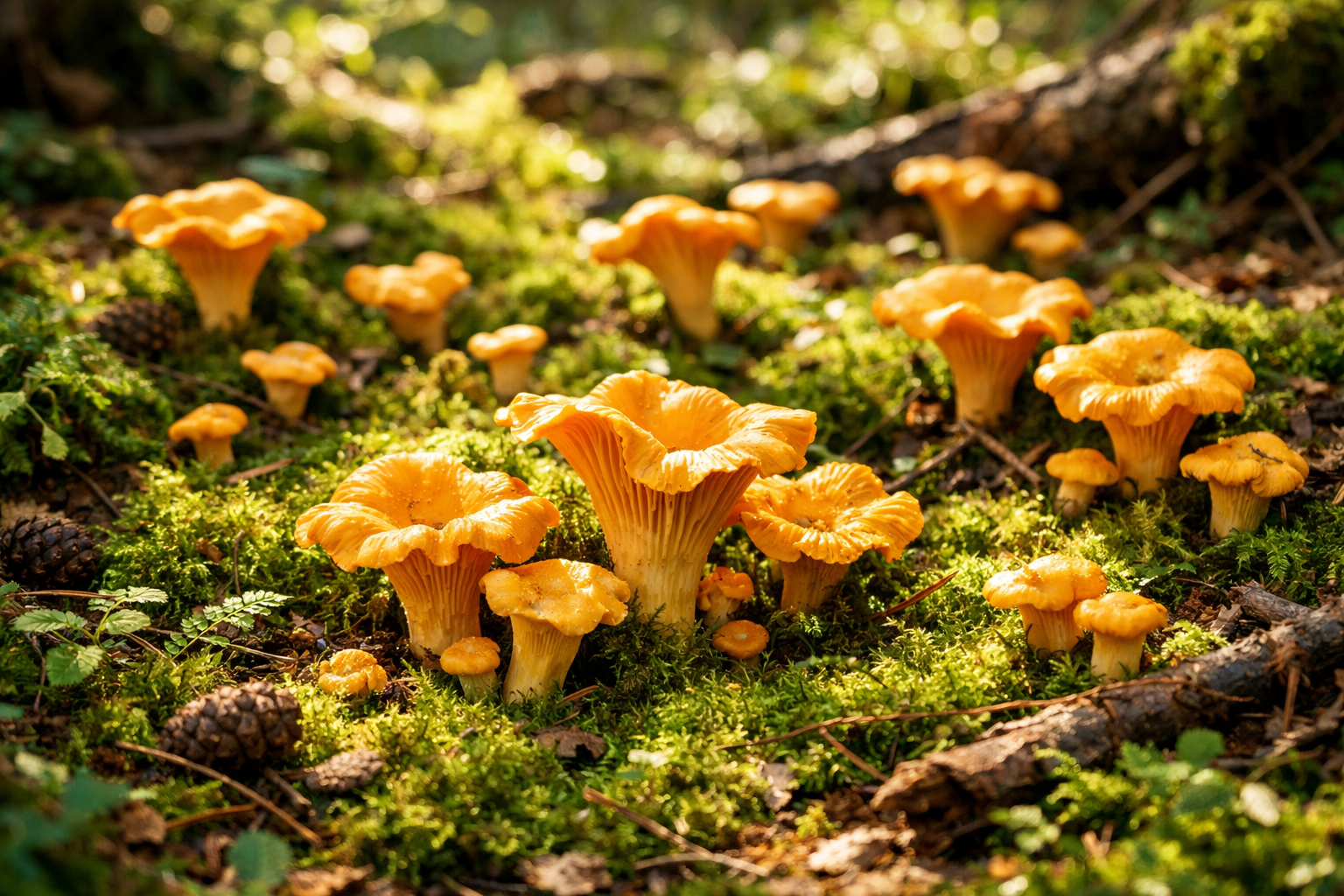
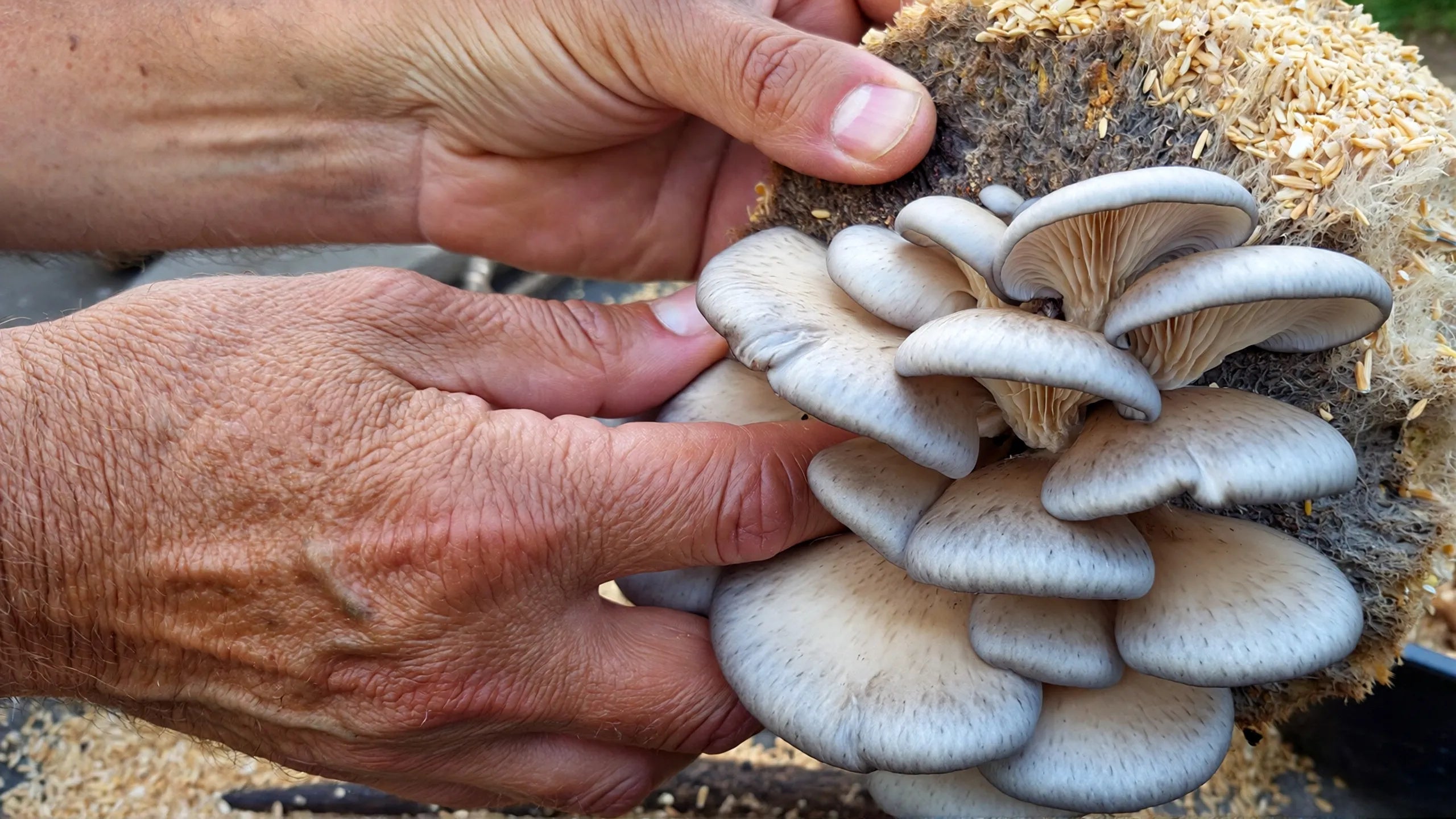
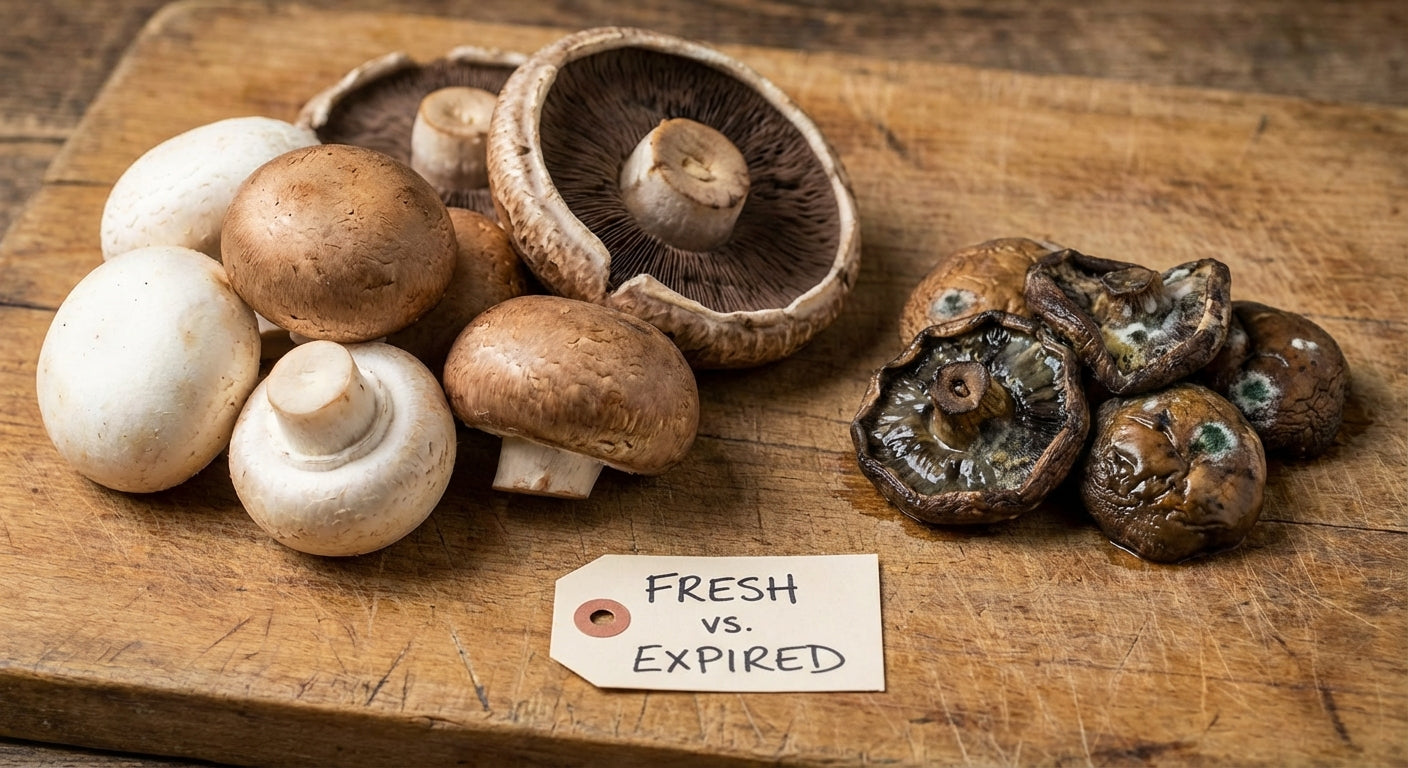
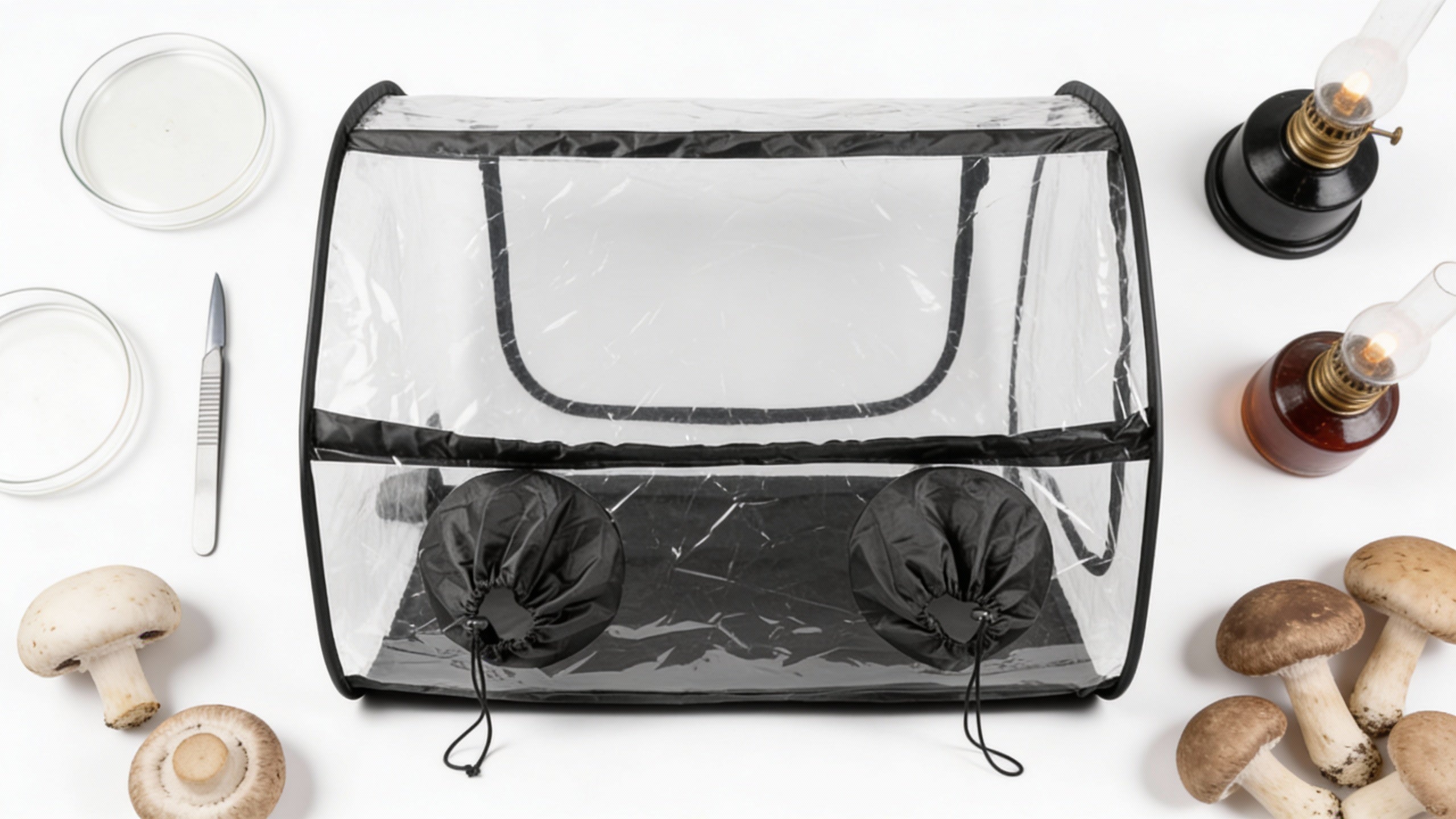
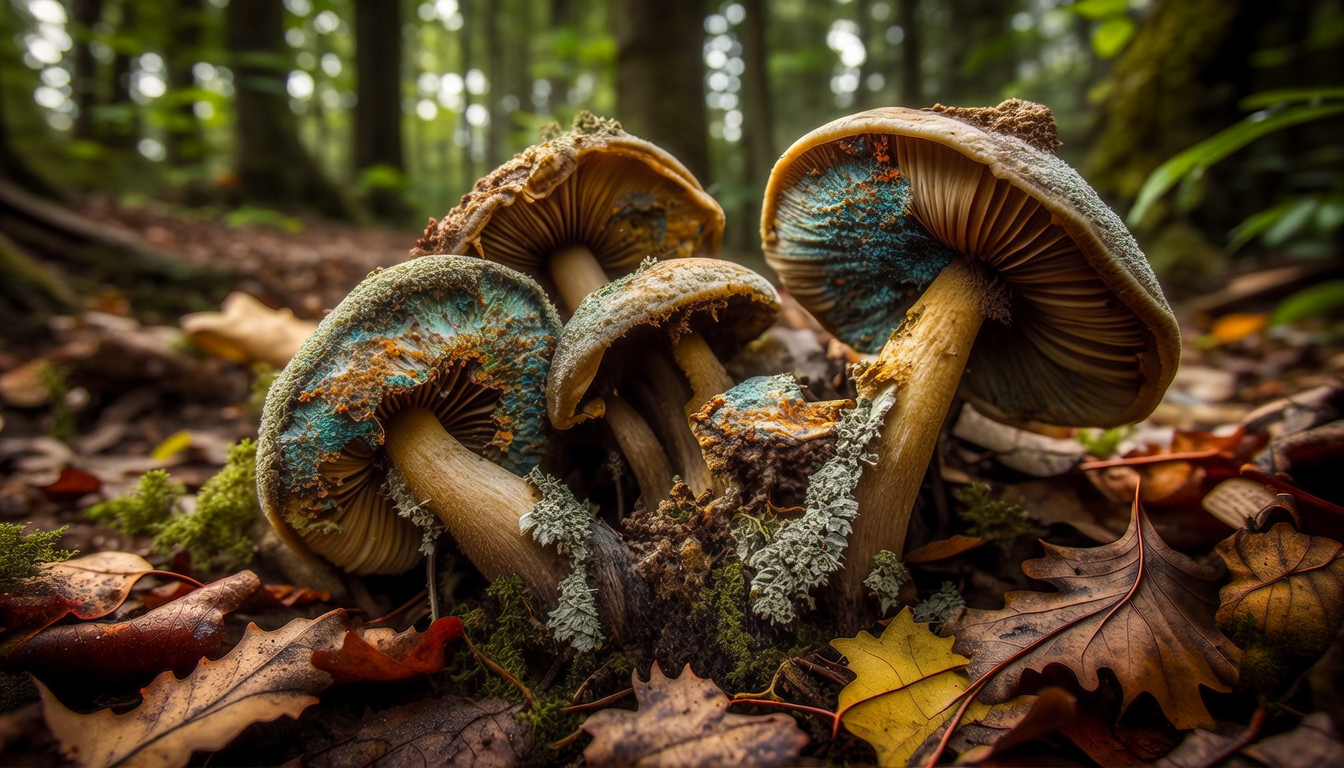
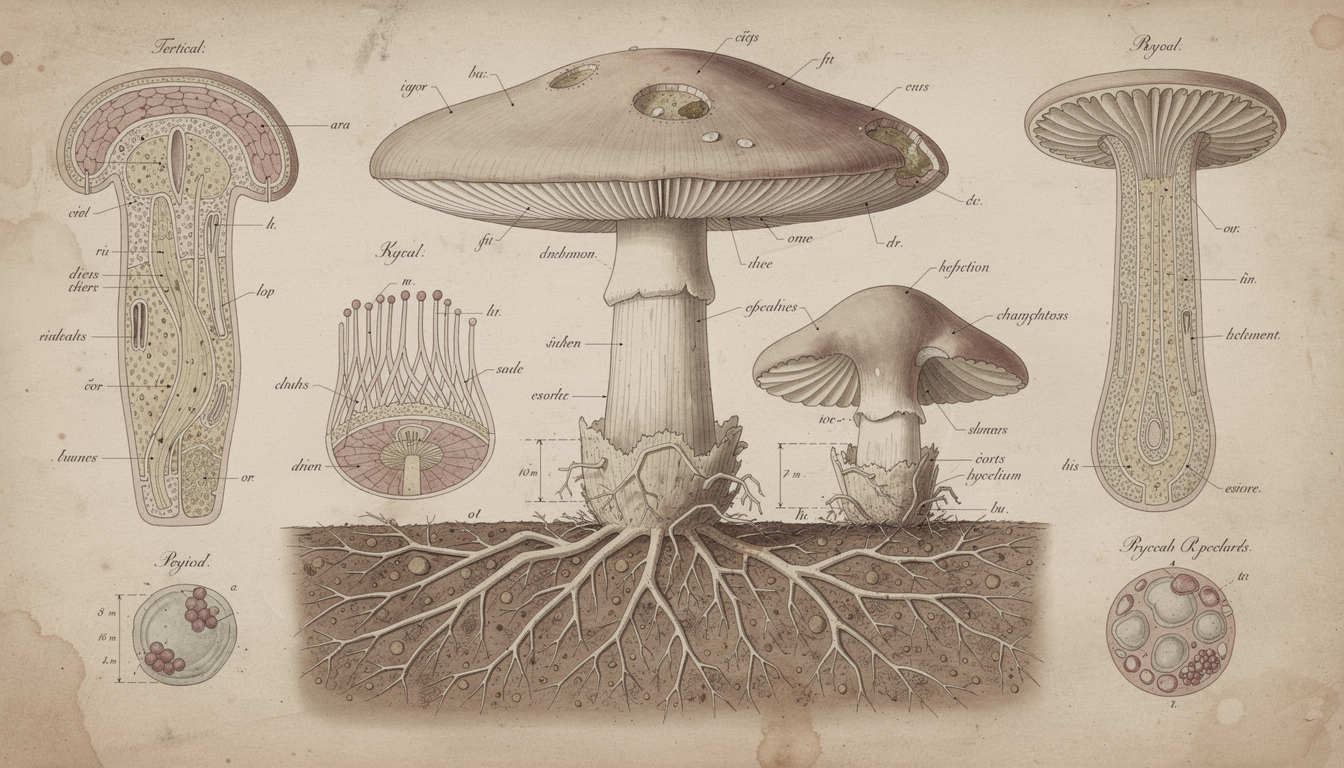
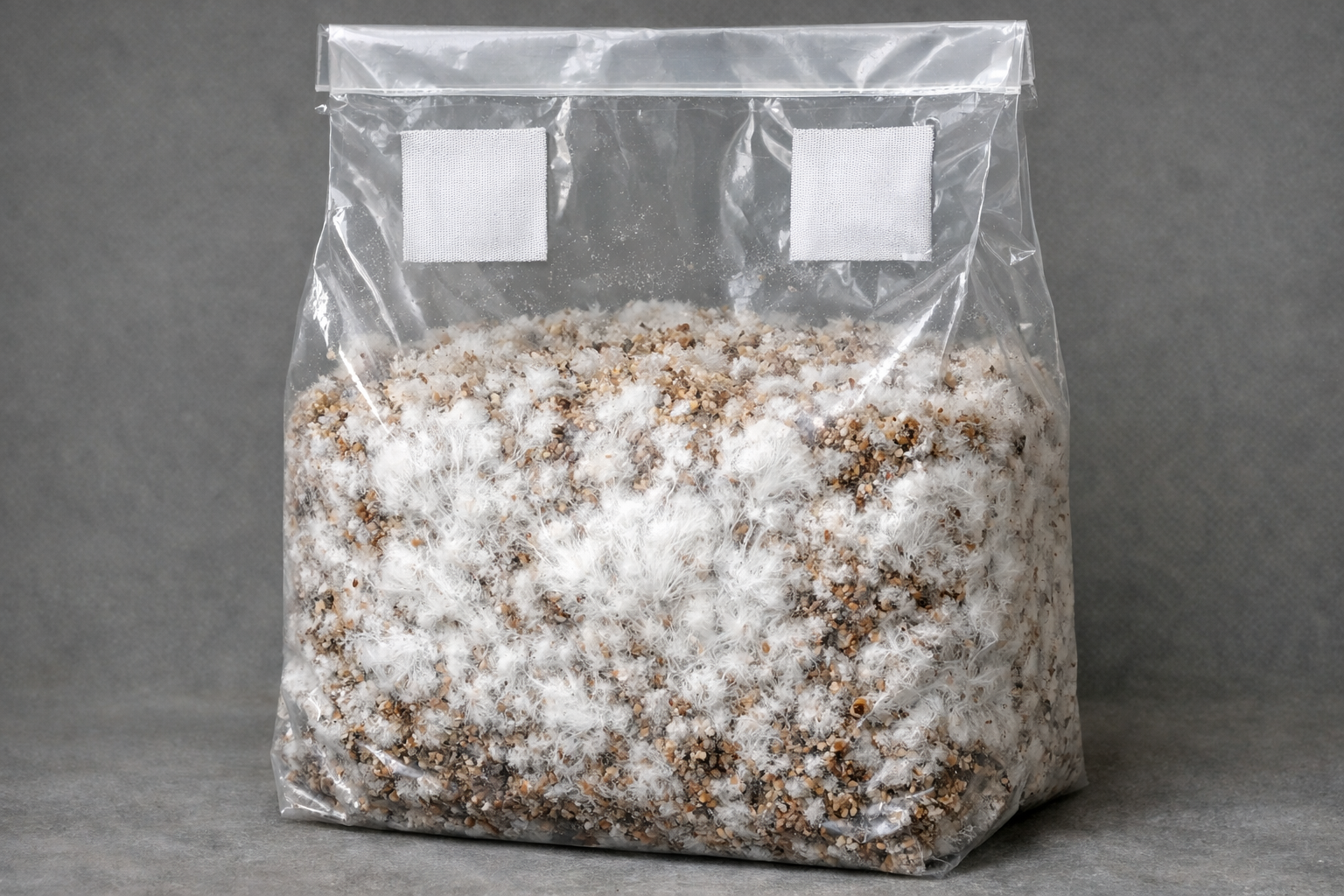

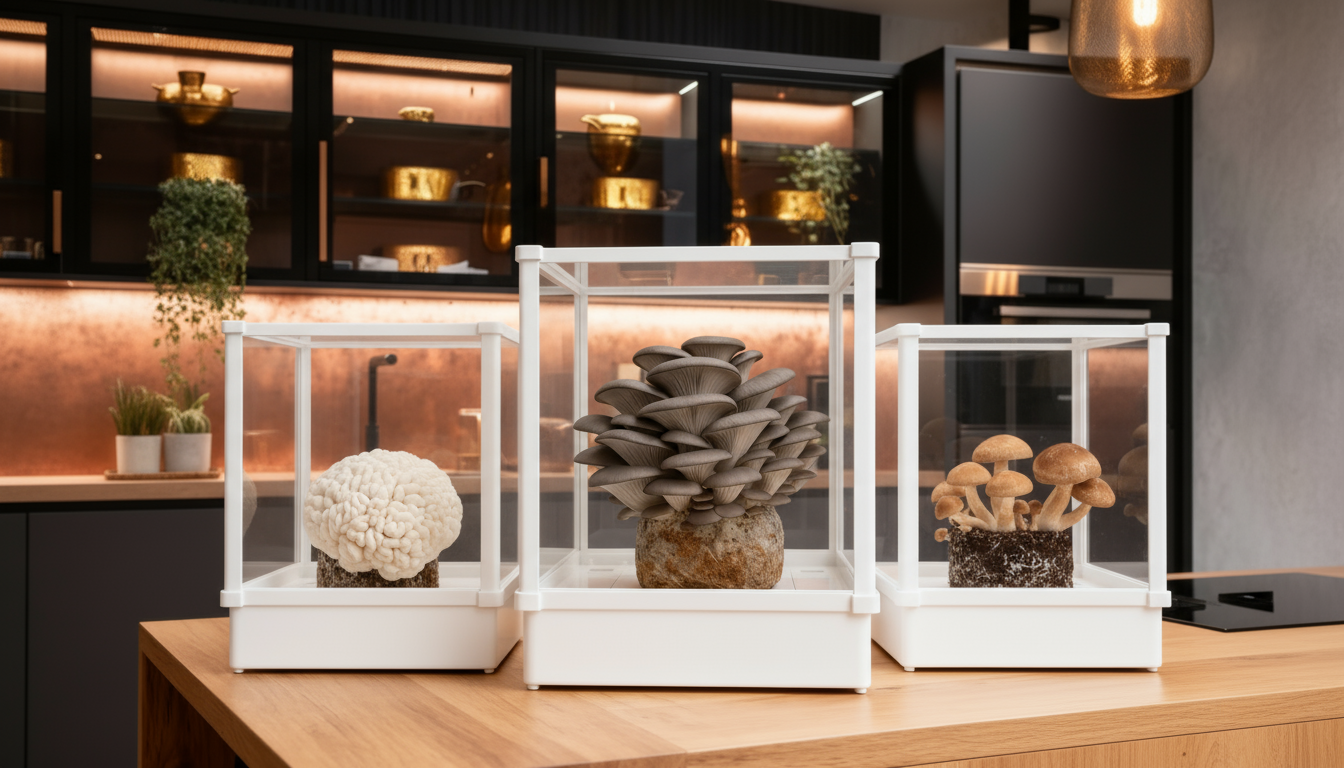
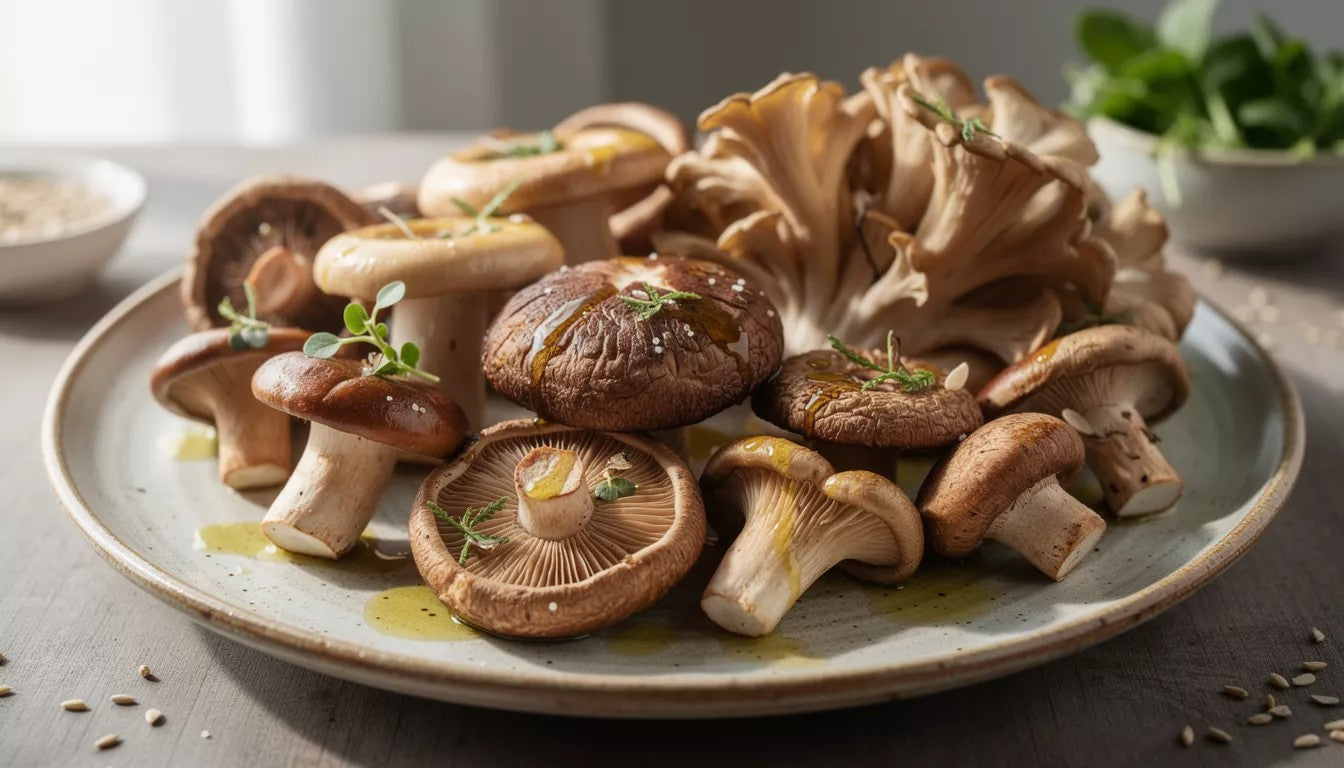
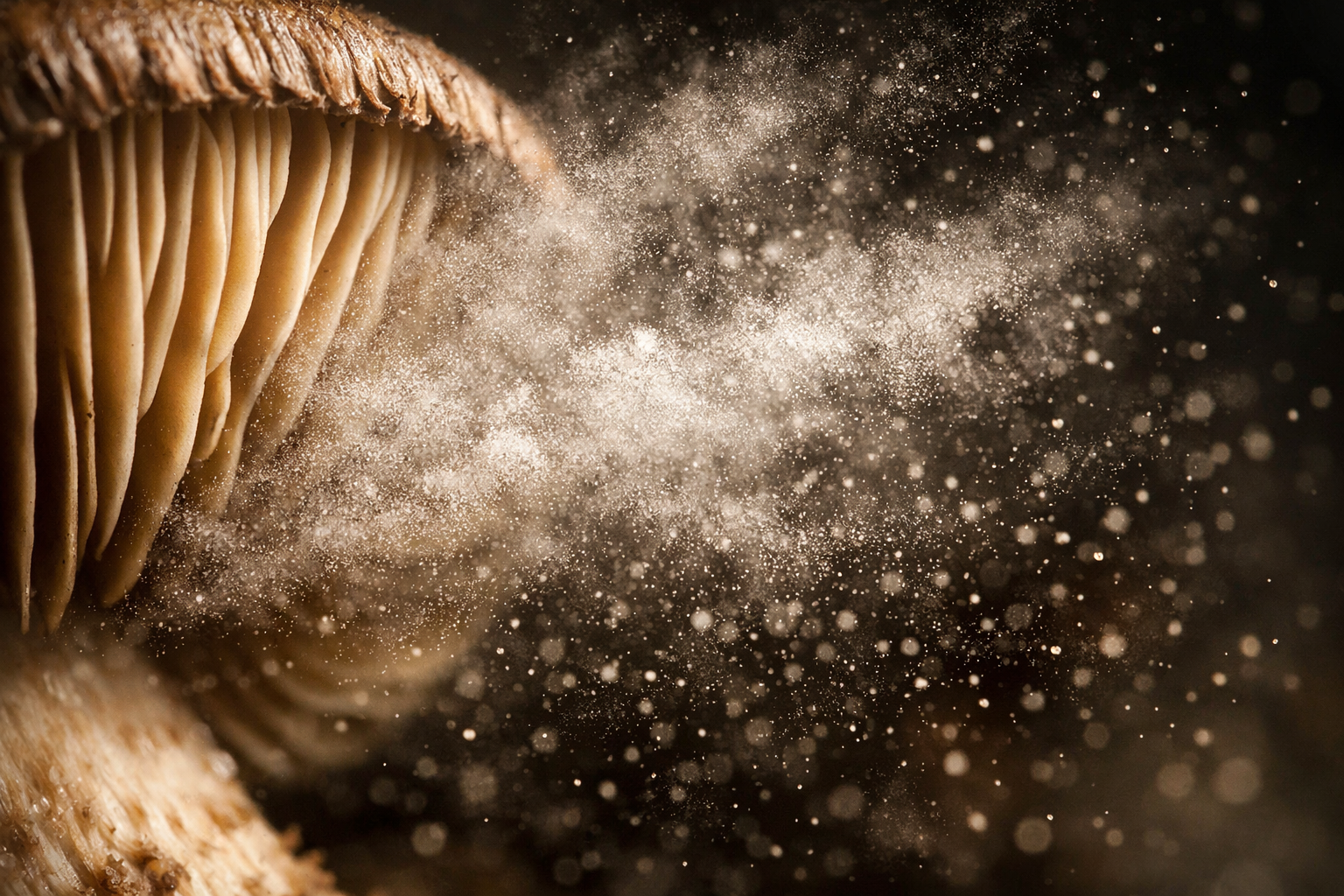
Share:
Maitake Mushroom Substitute: Delicious Alternatives
Freezing Maitake Mushrooms: The Best Way to Keep Them Fresh